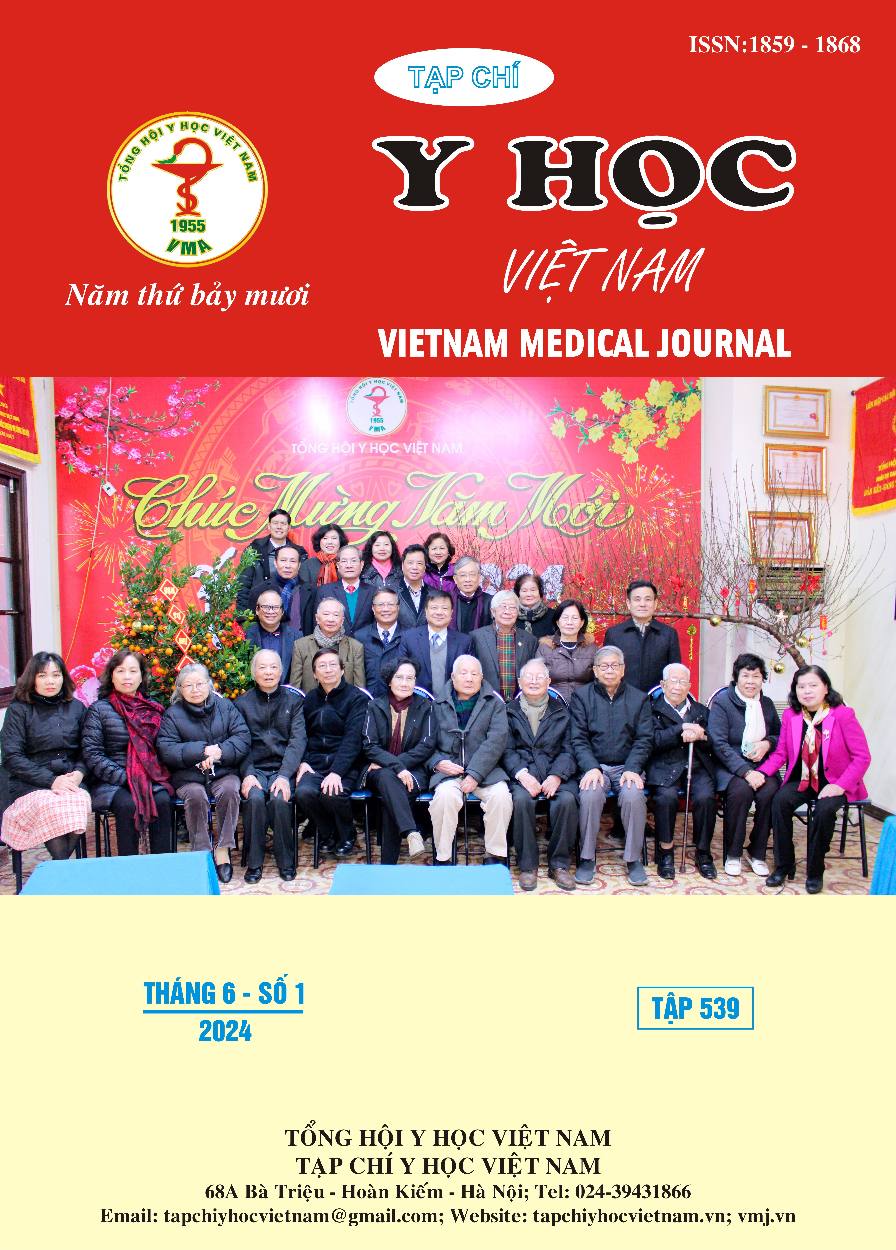ASSESSMENT OF NUTRITIONAL STATUS IN OLDER PATIENTS WITH MILD COGNITIVE IMPAIRMENT
Main Article Content
Abstract
Objectives: to assess nutritional status and its association with general characteristics in older patients with mild cognitive impairment. Subjects and methods: Cross-sectional descriptive study on 68 patients ³ 60 years old diagnosed with mild cognitive impairment examined and treated at the National Geriatric Hospital. Nutritional status was assessed using the Mini Nutritional Assessment (MNA-SF). Results: The proportion of patients with malnutrition and the risk of malnutrition were 16.2% and 57.4%, respectively. In the six elements of MNA-SF, the proportion of patients with reduced food consumption was 50%, of which 2.9% had a severe decrease; Unintentional weight loss of 1-3kg and >3kg in the past 3 months was 25%, and 7.3%, respectively. 20.6% of patients were able to get out of bed/chair, and 8.8% of patients could only lie in bed/chair. 22.1% of patients experienced psychological stress or acute illness within the past 3 months. The proportion of patients with severe depression/mild dementia was low. One-quarter of the study subjects had a BMI < 19 kg/m2. There was a statistically significant difference between malnutrition/risk of malnutrition and osteoarthritis (p<0.05). There was no difference between nutritional status and age, gender, living status, place of residence, and other comorbidities (p>0.05). Conclusion: The rate of malnutrition and the risk of malnutrition in elderly patients with mild cognitive impairment were quite high, so they need to be evaluated regularly.
Article Details
Keywords
mild cognitive impairment, older adults, nutrition
References
2. Tsoy RT, Turuspekova ST, Klipitskaya NK, Mereke A, Cumming RG. Prevalence of Mild Cognitive Impairment Among Older People in Kazakhstan and Potential Risk Factors: A Cross-sectional Study. Alzheimer Dis Assoc Disord. 2019;33(2): 136-141. doi: 10.1097 /WAD. 0000000000000298
3. Yu W, Yu W, Liu X, et al. Associations of cognitive condition with nutritional status in an elderly population: an analysis based on a 7-year database in Chongqing, the Southwest of China. Published online December 7, 2021. doi: 10. 21203/rs.3.rs-21402/v1
4. Tảo NTN, Anh PTL. Tỷ lệ suy dinh dưỡng và một số yếu tố liên quan ở người cao tuổi dân tộc Khmer tại huyện Trà Cú, tỉnh Trà Vinh năm 2020. Tạp Chí Học Dự Phòng. 2021;31(3):121-128. doi:10.51403/0868-2836/2021/321
5. Soysal P, Veronese N, Arik F, Kalan U, Smith L, Isik AT. Mini Nutritional Assessment Scale-Short Form can be useful for frailty screening in older adults. Clin Interv Aging. 2019;14:693-699. doi:10.2147/CIA.S196770
6. Hai S, Cao L, Yang X, et al. Association Between Nutrition Status and Cognitive Impairment Among Chinese Nonagenarians and Centenarians. Int J Gerontol. 2017;11(4):215-219. doi:10.1016/j.ijge.2016.12.002
7. Vincze G, Almos P, Boda K, et al. Risk factors of cognitive decline in residential care in Hungary. Int J Geriatr Psychiatry. 2007;22(12):1208-1216. doi:10.1002/gps.1815
8. Ravaglia G, Forti P, Montesi F, et al. Mild Cognitive Impairment: Epidemiology and Dementia Risk in an Elderly Italian Population. J Am Geriatr Soc. 2008; 56(1): 51-58. doi:10.1111/ j.1532-5415.2007.01503.x
9. Nguyen TTH, Vu HTT, Nguyen TN, et al. Assessment of nutritional status in older diabetic outpatients and related factors in Hanoi, Vietnam. J Multidiscip Healthc. 2019; 12: 601-606. doi: 10.2147/JMDH.S194155
10. Anandacoomarasamy A, Caterson I, Sambrook P, Fransen M, March L. The impact of obesity on the musculoskeletal system. Int J Obes (Lond). 2008; 32(2): 211-222. doi:10.1038/ sj.ijo.0803715


